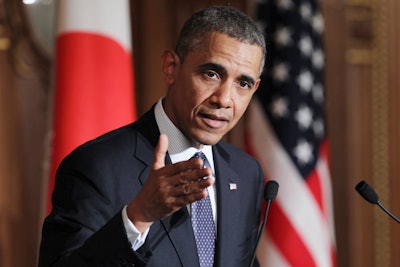
No doubt President Barack Obama is fond of Nike. Golf outings often find him decked out from head to toe in apparel featuring the emblematic company swoosh. Now the president is putting the company logo on his trade agenda.
On Friday, the president will visit Nike headquarters in Beaverton, Oregon, to make his trade policy pitch as he struggles to win over Democrats for what could be the last major legislative push of his presidency. But in choosing the giant sneaker and athletic wear company as his backdrop, Obama has stirred a hornets' nest.
Nike, a major exporter, employs more than 8,500 workers in Oregon, many in well-paying design, research or marketing jobs. But of Nike's slightly more than 1 million factory contract workers, more than nine out of ten are in Asia, with the largest number in low-wage Vietnam.
 "It is a perverse place to try to go and sell a trade agreement that the American public thinks would make it easier to offshore our jobs and push down our wages," said Lori Wallach, the director of Public Citizen's Global Trade Watch.
"It is a perverse place to try to go and sell a trade agreement that the American public thinks would make it easier to offshore our jobs and push down our wages," said Lori Wallach, the director of Public Citizen's Global Trade Watch.
For Obama, the trade dependent Pacific Northwest is a natural place to make his case for trade negotiating authority and to promote a 12-nation Trans-Pacific trade agreement. Congress is debating whether to give Obama so-called fast-track authority to complete that and other trade deals. Obama's toughest sell is with his own Democratic allies, who fear the loss of American jobs and weakened financial and environmental rules.
Nike, with its massive outsourcing of manufacturing, provides Obama with an opportunity to talk about labor standards he seeks to enforce with trade partners, particularly Vietnam where the U.S. concedes worker rights protections fall short of international standards. Of the 11 countries the U.S. is negotiating with in the Trans-Pacific talks, Nike has contract factories in seven of them.
White House spokesman Josh Earnest says the stop at Nike will "illustrate how a responsible trade agreement that includes enforceable labor and environmental standards would strongly benefit middle-class families and the American economy."
Friday's visit has a touch of gratitude as well. Sen. Ron Wyden of Oregon has been the biggest trade advocate among Democrats and was a key figure in getting fast track legislation out of the Senate Finance Committee with a bipartisan vote. The effort has prompted pickets at his Senate offices and at his Portland house.
But Obama's visit has created a backlash. Nike represents what many liberal groups and labor unions criticize about trade deals: the potential for shifting U.S. jobs to other countries with cheap labor and few worker protections. On Thursday, Sen. Bernie Sanders of Vermont, who recently announced he would challenge Hillary Clinton for the Democratic presidential nomination from the left, called on Obama to cancel the visit.
Two decades ago, Nike came under heavy criticism for its use of foreign sweatshops, including numerous reports of child labor, low wages and poor working conditions. Under intense public pressure, Nike improved conditions and eventually wages climbed, minimum age requirements were put in place and Nike increased training and monitoring at the factories.
"We've made significant improvements and driven positive change for workers in contract factories that make Nike product," Nike spokesman Greg Rossiter said in a statement to the Associated Press.
Rep. Earl Blumenauer, a Democrat who represents Portland and is supporting Obama's trade agenda, said the criticism of Nike is rooted in 20-year-old history. Citing Nike's creation of thousands of well-paying jobs in Oregon, Blumenauer said: "The more people look at the Nike story, the more that is a success not a problem."
Despite the advances and Nike's image make-over, labor issues have continued to plague its contracted manufacturers. An Associated Press investigation in 2011 found that workers making Nike-owned Converse sneakers in Indonesia said supervisors abused them physically and verbally. And in its latest report on "sustainable business performance" Nike found that one-third of its contract manufacturers in 2013 did not meet its minimum standards -- an improvement over 2011 when half of the manufacturers fell short. Most of the problems were over hours and wages.
"Nike fully supports the inclusion of strong labor provisions because we believe they will drive higher industry standards and create economic growth that benefits everyone," Nike's Rossiter said.
At a breakfast with reporters Thursday, Rep. Sander Levin, D-Mich., said he met a Vietnamese woman who spent more than four years in jail for trying to organize an independent labor union. Levin is the top Democrat on the Ways and Means Committee, which handles trade bills. He said the fast-track legislation and Trans-Pacific trade talks don't do enough to force Vietnam to raise its labor standards.
A Government Accountability Office report last year found that while some Latin American countries under current free trade agreements have taken steps to strengthen labor rights, enforcement was limited and that monitoring of labor standards in those countries by U.S. agencies is inconsistent.
Blumenauer is pushing for an enforcement trust fund to improve oversight.
"I agree enforcement is a problem," he said. "I'm not through trying to make it better."
___
Associated Press writer Charles Babington contributed to this report. Wozniacka reported from Portland.
___
Find Jim Kuhnhenn on Twitter at http://www.twitter.com/jkuhnhenn and Gosia Wozniacka on Twitter at http://www.twitter.com/gosiawozniacka






















